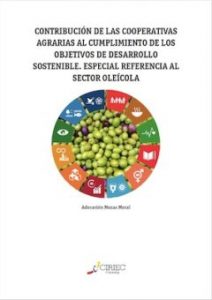UN Inter-Agency Task Force on Social and Solidarity Economy (TFSSE)
The UN Inter-Agency Task Force on Social and Solidarity Economy (TFSSE) aims to raise the visibility of debates about Social and Solidarity Economy (SSE) within the UN system and beyond. The members and observers of the Task Force have committed to undertake collaborative activities to:
- enhance the recognition of the role of SSE enterprises and organizations in sustainable development;
- promote knowledge of SSE and consolidate SSE networks;
- support the establishment of an enabling institutional and policy environment for SSE;
- ensure coordination of international efforts, and create and strengthen partnerships.
The work of the Task Force takes the form of joint initiatives among members: producing reports and briefs, organizing events related to SSE in connection with relevant UN processes and conferences, and creating partnerships and dialogues with governmental and civil society entities.
CIRIEC is one of the observers of the Task Force since October 2018. Others members and observers
More info on UN Inter-Agency Task Force on Social and Solidarity Economy (TFSSE) HERE
Publication of UNTFSSE HERE
Publications:
- WORKING PAPERS:
-
- Producing Statistics on Social and Solidarity Economy: The State of the Art / Marie J. Bouchard, Gabriel Salathé-Beaulieu, 2021
- Mapping International SSE Mapping Exercises / Coline Compère, Barbara Sak, Jérôme Schoenmaeckers, 2021
- Producing Statistics on Social and Solidarity Economy: Policy Recommendations and Directions for Future Research / Rafael Chaves-Avila, 2021
- ENCYCLOPEDIA OF THE SOCIAL AND SOLIDARITY ECONOMY – A Collective Work of the United Nations Inter-Agency Task Force on SSE (UNTFSSE)
Edited by Ilcheong Yi, United Nations Research Institute for Social Development (UNRISD), Switzerland, et al.
The Encyclopedia is available on the UNTFSSE – Knowledge Hub website & Edward Elgar Companion Website. 57 entries, 15 written by CIRIEC members, are in free access:- Origins and histories of the social and solidarity economy
- Contemporary Understandings of the Social and Solidarity Economy
- Postcolonial Theories and the Social and Solidarity Economy
- Globalization, Alter-globalization and the Social and Solidarity Economy
- Moral Economy, Human Economy, and the Social and Solidarity Economy
- Feminist Economics and the Social and Solidarity Economy
- Community Economics and the Social and Solidarity Economy
- Ecological Economics and the Social and Solidarity Economy
- The Commons and the Social and Solidarity Economy
- The Black Social Economy and the Social and Solidarity Economy
- Indigenous Economies and the Social and Solidarity Economy
- Heterodox Economics and the Social and Solidarity Economy
- Activism, Social Movements and the Social and Solidarity Economy
- Cooperatives and Mutuals
- Associations and Associationalism
- Non-Governmental Organizations and Foundations
- Social Enterprises
- Women’s Self-Help Groups
- Community-Based Organizations
- African American Social and Solidarity Economy and Distributive Justice
- LGBTQ+ Inclusion and the Social and Solidarity Economy
- Youth and the Social and Solidarity Economy
- Migrants, Refugees and the Social and Solidarity Economy
- The Sustainable Development Goals and the Social and Solidarity Economy
- Work Integration and Social Enterprises
- Sustainable Investment, Production, Consumption and the Social and Solidarity Economy
- Peace, Non-Violence, and the Social and Solidarity Economy
- Reduction of Hunger and Poverty and the Social and Solidarity Economy
- Reduction of Multi-dimensional Inequalities and the Social and Solidarity Economy
- Care and Home Support Services and the Social and Solidarity Economy
- Local Community Development and the Social and Solidarity Economy
- Gender Equality and Empowerment in the Social and Solidarity Economy
- The Food and Agriculture Sector and the Social and Solidarity Economy
- The Finance Sector and the Social and Solidarity Economy
- The Housing Sector and the Social and Solidarity Economy
- Energy, Water and Waste Management Sectors and the Social and Solidarity Economy
- Tourism Sector and the Social and Solidarity Economy
- Social Services and the Social and Solidarity Economy
- Information and Communication Technology (ICT) and the Social and Solidarity Economy
- Culture, Sports and Leisure Sectors and the Social and Solidarity Economy
- Education Sector and the Social and Solidarity Economy
- Health and Care Sector and the Social and Solidarity Economy
- The Institutional Ecosystem of the Social and Solidarity Economy
- Public Policy and the Social and Solidarity Economy
- Social Policy and the Social and Solidarity Economy
- Social and Solidarity Economy and Co-optation, Isomorphism, and Instrumentalisation
- Supporting Organizations and Intermediaries for Social and Solidarity Economy
- Legal Frameworks and Laws for the Social and Solidarity Economy
- Local and Territorial Development Plans and the Social and Solidarity Economy
- Partnership and Co-construction and the Social and Solidarity Economy
- Statistical Measurement of the Social and Solidarity Economy
- Access to Markets for the Social and Solidarity Economy
- Financing for the Social and Solidarity Economy
- Participation, Governance, Collective Action, Democracy and the Social and Solidarity Economy
- Social and Solidarity Economy and Resilience in the Context of Multiple Crises
- Working Conditions and Wages in the Social and Solidarity Economy
- Management of Social and Solidarity Economy Organizations and Enterprises
UNRISD set up a Knowledge Hub Advisory Group composed of two members and two observers of the UNTFSSE of which CIRIEC. CIRIEC has been selected (2020-22) for its ability and contributions to the Knowledge Hub’s activities, and for its capacity to leverage its network for collaboration in communication.
The knowledge Hub currently runs 2 projects:
- The SSE Encyclopedia aims to provide policymakers and academics with a comprehensive reference tool on social and solidarity economy (SSE). Barbara Sak, representing CIRIEC, has been nominated to the Editorial Committee.
A call for submissions for this SSE Encyclopedia project will be announced in autumn 2020.- 1st meeting (9 July 2020): summary HERE
- Mapping systematic data and statistics on SSE, is coordinated by Marie J. Bouchard with the active involvement of Rafael Chaves and the secretariat of CIRIEC (incl. its Documentation Centre based in Liège). After the Expert Workshop in November 2019, 3 Working Papers will be produced by the end of 2020.
AUGUST 2021- 3 New UNTFSSE Working Papers by CIRIEC’ Authors in FREE ACCESS
These publications will be presented during the 8th CIRIEC INTERNATIONAL RESEARCH CONFERENCE ON SOCIAL ECONOMY in San José (COSTA RICA) from 08 to 10 September 2021.
- Producing Statistics on Social and Solidarity Economy: The State of the Art / Marie J. Bouchard, Gabriel Salathé-Beaulieu, 2021
- Mapping International SSE Mapping Exercises / Coline Compère, Barbara Sak, Jérôme Schoenmaeckers, 2021
- Producing Statistics on Social and Solidarity Economy: Policy Recommendations and Directions for Future Research / Rafael Chaves-Avila, 2021
IMPLEMENTING THE SUSTAINABLE DEVELOPMENT GOALS
What Role for Social and Solidarity Economy?
This event was part of a series of conferences resulting from the Call for Papers “Implementing the Sustainable Development Goals: What Role for Social and Solidarity Economy?” which was launched by UNRISD in 2018 and co-organized with the United Nations Inter-Agency Task Force on Social and Solidarity Economy (UNTFSSE) .
Identify and mobilize research from different regions and territories by critically examining the role of SSE in implementing SDGs is the objective.
SPECIAL SESSION organized by CIRIEC, ICA (International Cooperative Alliance), and SSE Forum International
SSE IMPACTS FOR THE SDGs:
Examples from India, Brazil and Spain
(Geneva, 25 June 2019)
- Moderator: Alain Arnaud, President, CIRIEC (Introduction in EN & FR)
- REEMA NANAVATY, General Secretary, SEWA – The Self Employed Women’s Association (SEWA) in India (Presentation + Nanavaty Presentation + SPEECH)
- LEANDRO MORAIS, Professor and Researcher, Universidade Estadual Paulista, Brazil – The Maranhão State Reference Center for Solidarity Economy (CRESOL): State Government and SSE Entrepreneurs Joining Forces in Brazil (Presentation)
 ADORACIÓN MOZAS, Professor, University of Jaén; President of CIRIEC-España – How Agricultural Cooperatives Achieve the SDGs (Presentation + the book CONTRIBUCIÓN DE LAS COOPERATIVAS AGRARIAS AL CUMPLIMIENTO DE LOS OBJETIVOS DE DESARROLLO SOSTENIBLE. ESPECIAL REFERENCIA AL SECTOR OLEÍCOLA)
ADORACIÓN MOZAS, Professor, University of Jaén; President of CIRIEC-España – How Agricultural Cooperatives Achieve the SDGs (Presentation + the book CONTRIBUCIÓN DE LAS COOPERATIVAS AGRARIAS AL CUMPLIMIENTO DE LOS OBJETIVOS DE DESARROLLO SOSTENIBLE. ESPECIAL REFERENCIA AL SECTOR OLEÍCOLA)- Discussants: ARIEL GUARCO, President, ICA & ALAIN COHEUR, Co-President, SSE Forum International
- WORKING PAPERS of the conference HERE
- More info here


